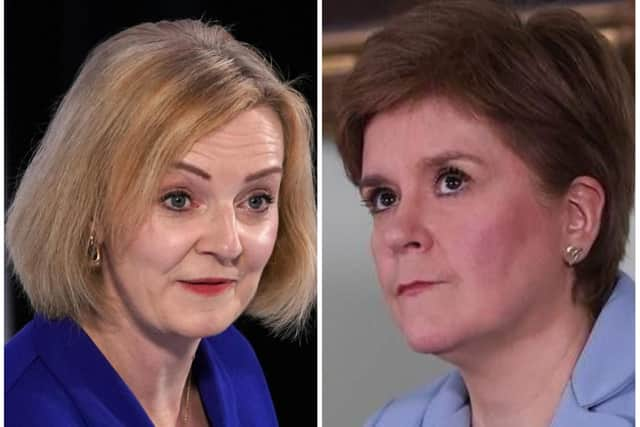Liz Truss: I'd rather be trapped in a lift with Nicola Sturgeon than Keir Starmer
Asked during the penultimate leadership hustings who she would choose in an ultimatum, she picked the First Minister.
“I’d hope to persuade her to stop being a separatist by the time we got to the ground floor,” she said.
Advertisement
Hide AdAdvertisement
Hide AdShe added: “Frankly, the idea of being stuck in a lift with Keir Starmer strikes me as extremely boring.”


Earlier in the campaign, Ms Truss described the First Minister as an “attention seeker” who is best ignored.
Meanwhile at the latest hustings, Ms Truss said anyone who believes the BBC is impartial is “kidding themselves”, adding she preferred “honest bias” to the pretense of neutrality
Asked at the penultimate leadership hustings on TalkTV whether the corporation was “Tory biased, Labour biased or steadfastly neutral, she replied: “I don’t think anybody is neutral.
“I think we’re all kidding ourselves if we pretend there are institutions or people who are neutral.
“I’d rather have more honest bias.”
The hustings also saw Truss claim the “jury’s out” on whether President Emmanuel Macron is “friend or foe” to the UK.
The Foreign Secretary added that if she was prime minister she would judge him on “deeds not words”.
And she questioned lockdown policy during the pandemic, and argued on reflection “we did do too much”.
Advertisement
Hide AdAdvertisement
Hide AdShe told the audience: “I did question it. I mean, I was not sitting on the committee that made the decisions. There was a specific committee, I think, with the Prime Minister, chancellor, health secretary.”
She added: “I think when Covid happened we were all hugely shocked. And there was a discussion about what the response should be. And clearly, in retrospect, we did do too much. You know, it was too draconian.”
It comes after her rival Rishi Sunak claimed in a Spectator interview he had often been a lone voice of resistance to lockdown measures within the Government.
Asked about this at the Norwich hustings, he said he was taking about “the lessons we should learn”, adding: “This is not to second guess the decisions we made at the time, which were extraordinarily difficult for everyone involved.”
He said: “Everyone was doing their absolute best at the time to do what they thought was right for the country. These were impossible decisions. But what I was talking about was having now been through it and had the experience of it, what can we learn from it?”
Comments
Want to join the conversation? Please or to comment on this article.

